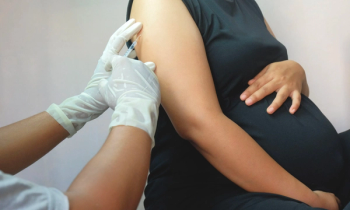
A recent study finds that, contrary to previous concerns, amniocentesis does not heighten the risk of mother-to-child transmission of hepatitis B virus among infants following a standardized immunoprophylaxis schedule.


A recent study finds that, contrary to previous concerns, amniocentesis does not heighten the risk of mother-to-child transmission of hepatitis B virus among infants following a standardized immunoprophylaxis schedule.

Review some of the top stories from the Contemporary OB/GYN website over the last week, and catch up on anything you may have missed.

Discover how transverse relaxation time mapping, a sensitive magnetic resonance imaging-based technique, unveils the relationship between placental oxygenation and fetal brain development, shedding light on potential biomarkers for assessing fetal well-being.

A recent investigation sheds light on patient preferences and concerns regarding external cephalic version versus cesarean section for managing fetal malpresentation, revealing gaps in counseling and the desire for more information.

New meta-analysis reveals heightened risks of major congenital malformations and respiratory distress syndrome in infants born to mothers with asthma, underlining the importance of proactive management during pregnancy.

Recent research delves into the repercussions of gestational diabetes mellitus on both maternal and perinatal health, shedding light on its effects in both singleton and twin pregnancies.

Discover how maternal tobacco usage during pregnancy affects memory and language skills in children aged 9 to 12 years, as revealed by a comprehensive cohort study.

Delve into the intricate correlation between human chorionic gonadotropin levels during pregnancy and various adverse outcomes, shedding light on its multifaceted role in maternal-fetal health.

Samantha Olson, MPH, highlights how maternal vaccination protects infants from influenza.

Nipocalimab, a monoclonal antibody targeting maternal alloantibodies, has received FDA Breakthrough Therapy Designation for treating severe hemolytic disease of the fetus and newborn.

Recent research led by David J. Rooney reveals that while folate, vitamin B12, and iron intake show no direct links to fetal parameters, lower maternal hemoglobin concentrations in late pregnancy are associated with faster fetal growth rates, larger birthweights, and increased placental weights.

A systematic review of 6 studies revealed that COVID-19 vaccination during pregnancy does not significantly increase the risk of preterm birth, providing crucial insights for public health policies and offering reassurance to healthcare providers and expectant mothers.

Review some of the top stories from the Contemporary OB/GYN website over the last week, and catch up on anything you may have missed.

A recent study challenged the hypothesis of maternal stress during pregnancy as a significant risk factor for ischemic heart disease and stroke in younger patients, shedding light on the nuanced relationship between prenatal stress and cardiovascular health.

A cohort analysis suggests autism may be poorly diagnosed among expectant mothers—and linked to poor birth outcomes.

A recent study revealed that the Nurse-Family Partnership's infant and toddler home visits significantly decrease obesity and hypertension risks in mothers and female offspring, emphasizing the potential cost-saving impact on physical health outcomes.

A recent study revealed that patients with 3 or more COVID-19 vaccination doses exhibit a significant increase in cord anti-Spike antibody levels compared to those with 2 doses.

A recent study revealed that infants exposed to buprenorphine during the first trimester exhibit a significantly decreased risk of developing congenital malformations associated with opioid exposure compared to infants exposed to methadone.

A recent study found that in utero exposure to maternal COVID-19 vaccination poses no increased risk for neurodevelopmental impairment in infants up to 18 months of age, addressing concerns about the impact of vaccine exposure on unborn children.

A recent study unveiled how prepregnancy body mass index influences twin births, with assisted reproductive technology use as a noteworthy mediator.

A comprehensive review reveals a minimal 0.5% risk of perinatal death in pregnancies diagnosed with vasa previa prenatally, emphasizing the importance of timely diagnosis and reduced stress for expectant families.

A recent CDC study reveals varying breastfeeding initiation rates among different racial and ethnic groups, emphasizing the importance of detailed data disaggregation for accurate public health insights.

A study revealed that higher maternal folic acid levels and frequent supplementation during pregnancy can significantly lower the risk of Kawasaki disease in infants, highlighting the potential protective role of folic acid.

A study reveals that while gestational diabetes mellitus often impacts twin pregnancies, optimal maternal glycemic control doesn't decrease associated complications, urging further research.

A recent study found no significant difference in neonatal hypoglycemia risk between intravenous insulin infusion and continuous subcutaneous insulin infusion for intrapartum glycemic control in pregnant individuals with type 1 diabetes mellitus.